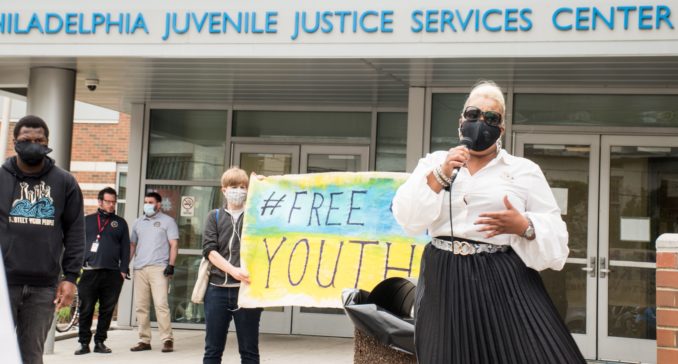Car caravan: Free Our Youth!
Philadelphia
As states across the U.S. took steps to stop the spread of COVID-19 — closing schools and workplaces, canceling events and shifting to supporting children in their homes and communities — one group of young people is being left behind: the nearly 50,000 youth locked up across the country. Releasing young people held in detention centers was the focus of a “Free Our Youth” car caravan in front of the Philadelphia Juvenile Justice Services Center on May 18.
At least two children have tested positive for COVID-19 while in juvenile jail, but the number of incarcerated youth has actually increased from 105 on May 7 to 125 on May 18. An additional 21 young people under 18 are currently in pretrial incarceration in the city’s adult jails, being held indefinitely because the courts are closed due to COVID-19. Many more Philadelphia youth are incarcerated in juvenile placement facilities outside the city, with possible release dates delayed because of court closures.
Teenagers between ages 15 and 17 can be charged as adults and held in adult jails in Pennsylvania because of Act 33, passed in 1995 for particular felonies that met certain conditions. On any given day, dozens of children ages 14 to 17 are housed in adult jails in counties across Pennsylvania while facing charges in adult court. Most will see their cases dismissed or moved to juvenile proceedings, but not before they spend weeks, months or even years locked up with adults.
Youth pretrial detention is marred by racial disparity. Less than 21 percent of white youth with delinquency cases are detained, compared to 32 percent of Latinx youth, 30 percent of Black youth, 26 percent of Indigenous youth and 25 percent of Asian, Native Hawaiian or Pacific Islander youth. Time held in confinement before trial isolates them from their families and communities and exposes them to the risk of victimization while detained. (see ojjdp.ojp.gov)
Discriminatory court practices increase racial disparity again after trials. For example, while 14 percent of all youth under 18 in the U.S. are Black, the percentage of youth in prison who are Black ranges from 35 to 42 percent, depending on gender. (prisonpolicy.org, Dec. 19)
Across the U.S., there are over 400 reported youth in juvenile facilities who have been diagnosed with COVID-19, not counting children held alongside adults in local jails, ICE detention centers, and other facilities.
‘It made me feel like a caged animal’
Speaking outside the West Philadelphia youth detention center’s front doors, formerly incarcerated young adults, family members of incarcerated young people, community leaders, City Council members and allies took turns describing the deep pain, fear, uncertainty and isolation that children have experienced while locked behind bars, separated from their families during the worst public health pandemic in a century.
Organizers shared an audio recording from one 16-year-old who spent time in adult jail during the pandemic: “We couldn’t come out of our cells that much or interact with each other. It made me feel like a caged animal. Since I’ve been home, it’s been hard to sleep.”
“As a parent, it’s heart-wrenching,” said Zekiya Cherif, whose 18-year-old son was recently transferred from PJJSC to another state facility. “It’s almost like your child’s life could be taken away with a sneeze or a cough. We are here to stand in the gap for our children, who are voiceless.”

Zekiya Cherif, whose son was previously incarcerated at the Philadelphia Juvenile Justice Services Center, speaks to protesters on May 18.Credit: WW: Joe Piette
Shineal Hunter said: “As an educator, and family member of an African-American youth recently involved with the criminal justice system, I am appalled by the injustices faced by Black and Brown families. … I want to ask Mayor Kenney: If it were a young person in his family, would he act now or allow them to sit in jail during the COVID-19 pandemic?”
City Councilmember Kendra Brooks said, “In juvenile detention facilities, social distancing looks a lot like solitary confinement. This kind of long-term isolation is not only deeply inhumane, but could have long term effects on youth development. The safest and most ethical thing we can do for them and for our communities is to bring them home.”
Michaela Pommells of Village of Arts and Humanities said, “We call on our city officials to imagine these young people as their own children and respond ethically and responsibly.”
People in cars listened to the event on Zoom as they stopped at the main entrance or drove around the facilities and honked after speeches, mimicking applause.
The community coalition called on officials to halt the new admission of youth to detention facilities; lift all juvenile detainers and bench warrants; prohibit the use of solitary confinement for youth currently in detention; suspend probation requirements, penalties and collection of fines and fees, and release all youth in detention back to caretakers or guardians.
The caravan protest was co-sponsored by The Youth Art & Self-empowerment Project, the Village of Arts & Humanities, Movement Alliance Project, Philadelphia Community Bail Fund, Philadelphia Bail Fund, Decarcerate PA, Reclaim Philadelphia, Amistad Law Project, ACLU of Pennsylvania, Human Rights Coalition, VietLead, National Domestic Workers Alliance-PA Chapter, Project SAFE, Philadelphia Student Union, Philly Neighborhood Networks and POWER Live Free.

